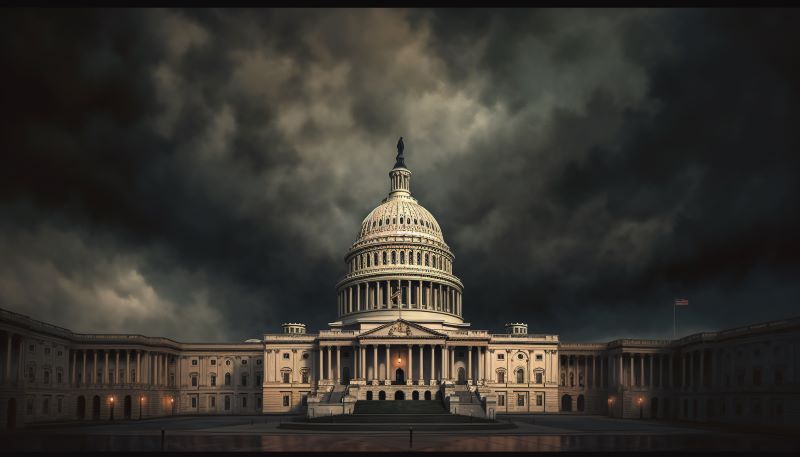
Oh, the glorious dance of democracy! It’s like watching a pair of elephants trying to tango. Our nation’s leaders in Washington have once again taken us to the brink of disaster with their ongoing pugilistic pas de deux over the debt ceiling.
In one corner, we have President Joe Biden, fresh off his shortened trip from Hiroshima, Japan, because nothing says “commitment to international diplomacy” like leaving a G7 summit early to return to the wailing and gnashing of teeth that is Washington D.C.. In the other corner, we have House Speaker Kevin McCarthy, who seems to be enjoying this particular brand of fiscal masochism a bit too much.
Congress needs to raise the debt ceiling, or else the U.S. could run out of cash to fully pay all of its obligation. But of course, it’s never that simple, is it? The Republican-controlled House, led by McCarthy, has decided that this is the perfect opportunity to press for slashes to the federal budget in exchange for raising the debt ceiling. Never mind that this could potentially lead to a default on our national debt, causing “serious harm to business and consumer confidence,” as Treasury Secretary Janet Yellen warned.
This is where things get interesting. The White House believes that the budget talks and the debt ceiling are completely separate issues, which they are. But McCarthy and his GOP colleagues have a different view. They believe that their pressure on the debt limit has brought Biden to the negotiating table. And what are they negotiating over? Ah, the sweet, sweet smell of potential welfare cuts. Republicans have long coveted stricter work requirements for federal benefits such as food stamps, something that President Biden has hinted he might be willing to entertain. It’s unclear how far he’s willing to go in this regard, but it’s definitely a sticking point in negotiations.
Now, one might think that in such dire circumstances, our nation’s leaders would put aside their differences and come together for the good of the country. But, oh no, that would be far too simple, far too reasonable. Instead, the negotiations came to an abrupt halt, because why not add a bit more drama to the mix? It’s unclear when talks will resume, but according to McCarthy, we can “see the path that we can come to an agreement.” I’m sure that’s very reassuring to the millions of.
And what about the 14th Amendment? That’s a particularly juicy tidbit. The White House has not ruled out invoking the 14th Amendment to bypass Congress and raise the debt ceiling, a move that some constitutional law experts and an increasing number of Democrats argue is valid based on Section 3 of the 14th Amendment. This section states that “the validity of the public debt of the United States … shall not be questioned.” Biden himself has gone on record stating that he believes he has the authority to do this, although he has expressed concerns about whether such a move could withstand potential litigation and appeals in court by the June 1 default deadline.
Nevertheless, invoking the 14th Amendment is not without its critics. McCarthy and other Republicans are wary of this move, and even within the Democratic party, there are divisions. Progressive Democrats are urging Biden to invoke the 14th Amendment, fearing that he might make spending concessions to get Republicans on board.
So there you have it. A Washington dance-off in full swing. McCarthy and the House Republicans are pushing for spending cuts, Biden is considering invoking the 14th Amendment, and the clock is ticking ever closer to a potential financial disaster. It’s a high-stakes game of chicken, with the American people caught in the middle. And as usual, it’s unclear when or how this will all be resolved. Meanwhile, the rest of the world watches on, no doubt amused by the spectacle of it all.
Both Biden and McCarthy described a “productive” White House meeting on raising the debt ceiling, but the “productivity” of their negotiations seems to be about as fruitful as trying to squeeze water out of a stone. McCarthy delivered a rather bleak outlook in a closed-door meeting with House Republicans, stating, “We are nowhere close to a deal”. And while the White House has indicated that Biden is open to some components of the Republican’s proposals, it’s unclear how much he’s willing to budge, particularly on the issue of stricter work requirements for recipients of federal benefits.
In this drama-filled tango, the rhythm is off, the steps are mismatched, and the music is discordant. But the dance goes on, as it always does, because this is the nature of democracy. The debt ceiling debate is emblematic of the larger political divides in our country, with each side entrenched in its own ideology, unwilling to compromise. And so we find ourselves on the precipice of a potential financial disaster, waiting with bated breath to see which elephant will stumble first.
In the end, the debt ceiling debate is more than just a financial issue; it’s a reflection of the state of our political discourse. It’s a glaring illustration of a government that seems more interested in political posturing than in serving the needs of its people. And while our leaders continue their high-stakes dance, the American people are left to wonder: When will the music stop?
And there we have it, folks. Democracy in action, warts and all. As the clock ticks closer to the debt ceiling deadline, it’s anyone’s guess how this saga will end. Will Biden invoke the 14th Amendment? Will the Republicans get their desired spending cuts? Or will we witness yet another last-minute, backroom deal that merely kicks the can down the road?
Stay tuned, because in the grand theatre of American politics, the show must go on. And in this latest act of the debt ceiling drama, it’s clear that the stakes have never been higher.
